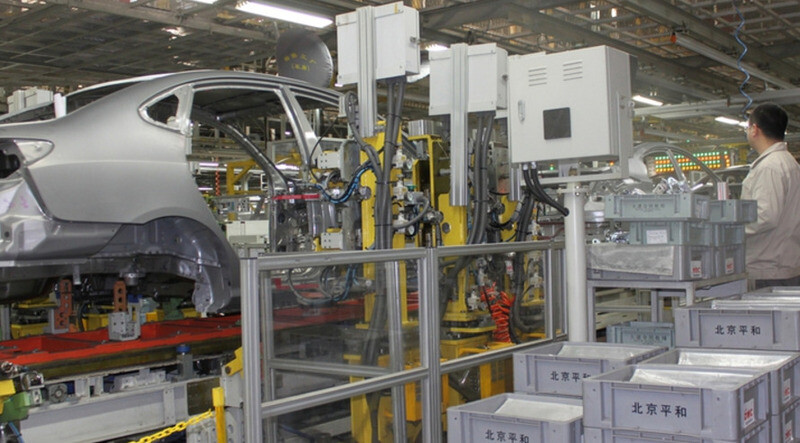hankyoreh
Links to other country sites 다른 나라 사이트 링크
[Editorial] Dialogue with Beijing needed to resolve THAAD dispute

Four of the Hyundai Motor Company’s factories in China were temporarily shut down before resuming operations on Aug. 30. The shutdown occurred when a Chinese parts manufacturer discontinued its supplies to Hyundai, which had failed to make payments on time because of its sagging sales in the Chinese market. For now, the Chinese company has resumed its supply of parts, allowing the factories to reopen, but the future doesn’t look bright. If sales in the Chinese market remain as stagnant as they are today, the company may face an even worse crisis down the road.
The difficulties that Hyundai and Kia are facing in the Chinese market would be unimaginable if not for the THAAD deployment. A boycott on South Korean products has caused automobile sales to plummet this year. As of July, Beijing Hyundai (Hyundai’s branch in China) had sold 415,000 units this year, down almost 30% from the same period last year. The reason the company has been unable to pay its parts suppliers on time is because of this cash crunch. Automakers are not the only companies that are in trouble. The Lotte Group, which provided Seoul with the THAAD site in a land swap, is suffering tremendous losses, with around 90 of its more than 100 retailers in China closed for business.
It’s regrettable that China is using the THAAD deployment as a pretext for meting out this kind of economic retribution to companies in the South Korean private sector. In particular, Beijing Hyundai and Dongfeng Yueda Kia (Hyundai and Kia’s Chinese offices) are joint ventures that are split fifty-fifty with Chinese companies. Such incidents are likely to create serious difficulties for economic cooperation between South Korea and China in the future.
Chinese companies don’t stand to gain from the boycott on South Korean automobiles, either. According to reports in the Chinese media about sales of new cars per company as of this May, the number of new cars sold by South Korean companies decreased by 43%, reducing its market share from 7.2% to 3.2%. But most of the difference went to Japanese companies. The number of units sold by Japanese companies increased by 17.6%, and its market share shot up from 15.0% to 17.3%. And if these developments cause anti-Chinese sentiment to increase among Koreans, in the long term this may prove to be a case of short-sighted thinking by China as well.
Seoul must not remain silent about China’s economic retribution for the THAAD deployment. The previous administration under former president Park Geun-hye promised that the THAAD deployment it was promoting would not have any negative impact on the economy, but it was clear from beginning that such statements were irresponsible. The new administration has decided to temporarily deploy all four remaining THAAD launchers as a response to North Korea’s missile launches. This is a matter that cannot be resolved without action by the government. Seoul needs to actively engage in dialogue with Beijing.
Please direct questions or comments to [english@hani.co.kr]

Editorial・opinion
![[Guest essay] Maybe Korea’s rapid population decline is an opportunity, not a crisis [Guest essay] Maybe Korea’s rapid population decline is an opportunity, not a crisis](https://flexible.img.hani.co.kr/flexible/normal/500/300/imgdb/original/2024/0430/9417144634983596.jpg) [Guest essay] Maybe Korea’s rapid population decline is an opportunity, not a crisis
[Guest essay] Maybe Korea’s rapid population decline is an opportunity, not a crisis![[Column] Can Yoon steer diplomacy with Russia, China back on track? [Column] Can Yoon steer diplomacy with Russia, China back on track?](https://flexible.img.hani.co.kr/flexible/normal/500/300/imgdb/original/2024/0430/1617144616798244.jpg) [Column] Can Yoon steer diplomacy with Russia, China back on track?
[Column] Can Yoon steer diplomacy with Russia, China back on track?- [Column] Season 2 of special prosecutor probe may be coming to Korea soon
- [Column] Park Geun-hye déjà vu in Yoon Suk-yeol
- [Editorial] New weight of N. Korea’s nuclear threats makes dialogue all the more urgent
- [Guest essay] The real reason Korea’s new right wants to dub Rhee a founding father
- [Column] ‘Choson’: Is it time we start referring to N. Korea in its own terms?
- [Editorial] Japan’s rewriting of history with Korea has gone too far
- [Column] The president’s questionable capacity for dialogue
- [Column] Are chaebol firms just pizza pies for families to divvy up as they please?
Most viewed articles
- 1Under conservative chief, Korea’s TRC brands teenage wartime massacre victims as traitors
- 2[Guest essay] Maybe Korea’s rapid population decline is an opportunity, not a crisis
- 3Value of Korean won down 7.3% in 2024, a steeper plunge than during 2008 crisis
- 4[Column] Can Yoon steer diplomacy with Russia, China back on track?
- 5Two factors that’ll decide if Korea’s economy keeps on its upward trend
- 6First meeting between Yoon, Lee in 2 years ends without compromise or agreement
- 7Months and months of overdue wages are pushing migrant workers in Korea into debt
- 8‘We must say no’: Seoul defense chief on Korean, USFK involvement in hypothetical Taiwan crisis
- 9After election rout, Yoon’s left with 3 choices for dealing with the opposition
- 10Why Kim Jong-un is scrapping the term ‘Day of the Sun’ and toning down fanfare for predecessors